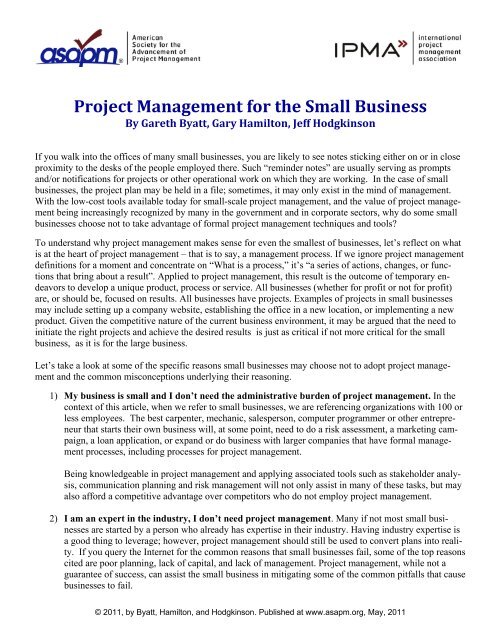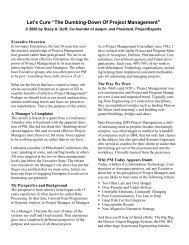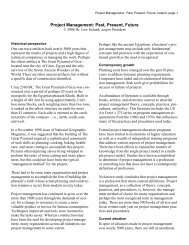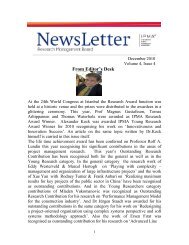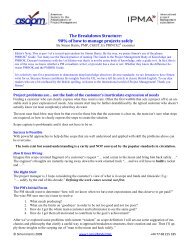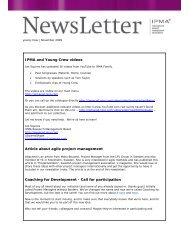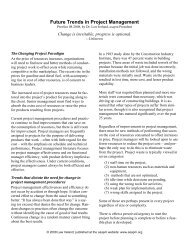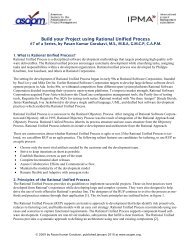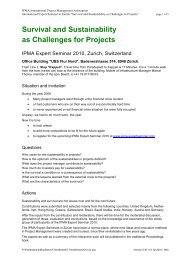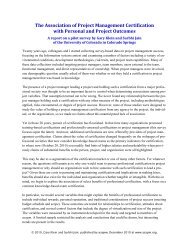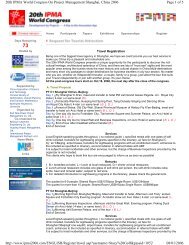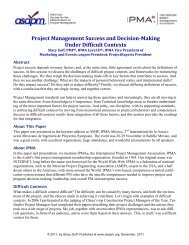Project Management for the Small Business - asapm
Project Management for the Small Business - asapm
Project Management for the Small Business - asapm
Create successful ePaper yourself
Turn your PDF publications into a flip-book with our unique Google optimized e-Paper software.
<strong>Project</strong> <strong>Management</strong> <strong>for</strong> <strong>the</strong> <strong>Small</strong> <strong>Business</strong><br />
By Gareth Byatt, Gary Hamilton, Jeff Hodgkinson<br />
If you walk into <strong>the</strong> offices of many small businesses, you are likely to see notes sticking ei<strong>the</strong>r on or in close<br />
proximity to <strong>the</strong> desks of <strong>the</strong> people employed <strong>the</strong>re. Such “reminder notes” are usually serving as prompts<br />
and/or notifications <strong>for</strong> projects or o<strong>the</strong>r operational work on which <strong>the</strong>y are working. In <strong>the</strong> case of small<br />
businesses, <strong>the</strong> project plan may be held in a file; sometimes, it may only exist in <strong>the</strong> mind of management.<br />
With <strong>the</strong> low-cost tools available today <strong>for</strong> small-scale project management, and <strong>the</strong> value of project management<br />
being increasingly recognized by many in <strong>the</strong> government and in corporate sectors, why do some small<br />
businesses choose not to take advantage of <strong>for</strong>mal project management techniques and tools?<br />
To understand why project management makes sense <strong>for</strong> even <strong>the</strong> smallest of businesses, let’s reflect on what<br />
is at <strong>the</strong> heart of project management – that is to say, a management process. If we ignore project management<br />
definitions <strong>for</strong> a moment and concentrate on “What is a process,” it’s “a series of actions, changes, or functions<br />
that bring about a result”. Applied to project management, this result is <strong>the</strong> outcome of temporary endeavors<br />
to develop a unique product, process or service. All businesses (whe<strong>the</strong>r <strong>for</strong> profit or not <strong>for</strong> profit)<br />
are, or should be, focused on results. All businesses have projects. Examples of projects in small businesses<br />
may include setting up a company website, establishing <strong>the</strong> office in a new location, or implementing a new<br />
product. Given <strong>the</strong> competitive nature of <strong>the</strong> current business environment, it may be argued that <strong>the</strong> need to<br />
initiate <strong>the</strong> right projects and achieve <strong>the</strong> desired results is just as critical if not more critical <strong>for</strong> <strong>the</strong> small<br />
business, as it is <strong>for</strong> <strong>the</strong> large business.<br />
Let’s take a look at some of <strong>the</strong> specific reasons small businesses may choose not to adopt project management<br />
and <strong>the</strong> common misconceptions underlying <strong>the</strong>ir reasoning.<br />
1) My business is small and I don’t need <strong>the</strong> administrative burden of project management. In <strong>the</strong><br />
context of this article, when we refer to small businesses, we are referencing organizations with 100 or<br />
less employees. The best carpenter, mechanic, salesperson, computer programmer or o<strong>the</strong>r entrepreneur<br />
that starts <strong>the</strong>ir own business will, at some point, need to do a risk assessment, a marketing campaign,<br />
a loan application, or expand or do business with larger companies that have <strong>for</strong>mal management<br />
processes, including processes <strong>for</strong> project management.<br />
Being knowledgeable in project management and applying associated tools such as stakeholder analysis,<br />
communication planning and risk management will not only assist in many of <strong>the</strong>se tasks, but may<br />
also af<strong>for</strong>d a competitive advantage over competitors who do not employ project management.<br />
2) I am an expert in <strong>the</strong> industry, I don’t need project management. Many if not most small businesses<br />
are started by a person who already has expertise in <strong>the</strong>ir industry. Having industry expertise is<br />
a good thing to leverage; however, project management should still be used to convert plans into reality.<br />
If you query <strong>the</strong> Internet <strong>for</strong> <strong>the</strong> common reasons that small businesses fail, some of <strong>the</strong> top reasons<br />
cited are poor planning, lack of capital, and lack of management. <strong>Project</strong> management, while not a<br />
guarantee of success, can assist <strong>the</strong> small business in mitigating some of <strong>the</strong> common pitfalls that cause<br />
businesses to fail.<br />
© 2011, by Byatt, Hamilton, and Hodgkinson. Published at www.<strong>asapm</strong>.org, May, 2011
<strong>Project</strong> <strong>Management</strong> <strong>for</strong> <strong>the</strong> <strong>Small</strong> <strong>Business</strong>; page 2<br />
3) <strong>Project</strong> <strong>Management</strong> will be an expense that reduces <strong>the</strong> cash capital that I need to start or grow<br />
my business. A common misconception is that it takes a huge investment of cash capital to implement<br />
project management process. In response to this argument, we contend that a plethora of free or low<br />
cost advice, techniques, templates and project management services are readily available and accessible<br />
through <strong>the</strong> Internet (including some low cost tools).<br />
If done correctly, <strong>the</strong> small business can implement project management processes, techniques and<br />
tools with very little cash capital, and may already be using software that can be used <strong>for</strong> project management.<br />
For example, certain email software, spreadsheet, and o<strong>the</strong>r common software applications<br />
offer good templates <strong>for</strong> project management, especially if used in collaboration with <strong>the</strong> free to low<br />
cost project management services on <strong>the</strong> Internet.<br />
4) I need to move now, and can’t wait. <strong>Project</strong> management will slow me down. This is <strong>the</strong> root of <strong>the</strong><br />
poor planning example cited previously. <strong>Project</strong> management can enable you to move quickly or,<br />
equally important, provide you with techniques to analyze whe<strong>the</strong>r some planned initiatives will in<br />
fact, upon scrutiny, not yield satisfactory results. Rushing into situations without thoroughly understanding<br />
your environment is dangerous and could result in negative outcomes.<br />
5) <strong>Project</strong> management requires specialized skills that I don’t have and cannot af<strong>for</strong>d to hire. <strong>Project</strong><br />
management is as much of an art as it is a science. While it does take specialized skills and experience<br />
to be a seasoned project management practitioner, <strong>the</strong>y are skills that can be learned over time. To<br />
“speed things up” it is possible to take a “crash course” in project management in as little as 4 or 5<br />
days. Many entrepreneurs who start small businesses tend to possess <strong>the</strong> knowledge needed <strong>for</strong> project<br />
management, and “crash courses” build on <strong>the</strong>se skills while introducing <strong>the</strong> specific <strong>the</strong>ories, tools,<br />
and processes essential <strong>for</strong> project management. While attendees will not emerge from such courses as<br />
project experts, <strong>the</strong>y can learn valuable skills to apply to <strong>the</strong>ir small business.<br />
6) It will require added time to follow project management practices. Having a process to follow may<br />
add time to <strong>the</strong> duration of an activity. However, to draw an analogy (that in itself requires project<br />
management to produce) – if you add an extension to your house, would you ra<strong>the</strong>r have a quality end<br />
result, or would you prefer to have it done quickly but with lots of problems (leaks, bad workmanship,<br />
et cetera)? Surely you would prefer <strong>the</strong> <strong>for</strong>mer. Given that small business projects can be deal-breakers<br />
if <strong>the</strong>y go badly, doing it well is essential, and project management processes can help ensure you do<br />
things well.<br />
While some of <strong>the</strong> above examples are not limited to <strong>the</strong> small business, <strong>the</strong>y are common reasons we hear <strong>for</strong><br />
<strong>the</strong>ir failure to adopt <strong>for</strong>mal project management. <strong>Project</strong> management offers value <strong>for</strong> any size business, and<br />
does not require a large investment of cash capital to establish. In order to minimize risk and set a small business<br />
up <strong>for</strong> success, we contend that such businesses can benefit from some <strong>for</strong>m of <strong>for</strong>mal project management.<br />
© 2011, by Byatt, Hamilton, and Hodgkinson. Published at www.<strong>asapm</strong>.org, May, 2011
Article Author Bios<br />
About<br />
The<br />
Article<br />
Authors,<br />
Their Roles<br />
Their Plans,<br />
And Their Goals<br />
<strong>Project</strong> <strong>Management</strong> <strong>for</strong> <strong>the</strong> <strong>Small</strong> <strong>Business</strong>; page 3<br />
Gareth Byatt, Gary Hamilton, and Jeff Hodgkinson are experienced PMO, program, and<br />
project managers who developed a mutual friendship by realising <strong>the</strong>y shared a common<br />
passion to help o<strong>the</strong>rs and share knowledge about PMO, portfolio, program and project<br />
management (collectively termed PM below). In February 2010 <strong>the</strong>y decided to collaborate<br />
on a five (5) year goal to write 100 PM subject articles (pro bono) <strong>for</strong> publication in<br />
any/all PM subject websites, newsletters, and professional magazines / journals.<br />
They have been translated into Arabic, Czechoslovakian, French, German, Italian, Spanish,<br />
Portuguese, and Russian and published on websites in Australia, Brazil, Canada,<br />
Chile, Czech Republic, France, Germany, Hong Kong, Italy, India, Ne<strong>the</strong>rlands, New Zealand,<br />
Poland, Russia, Turkey, UK, and <strong>the</strong> USA.<br />
Their mission is to help expand good program and project management practices by<br />
promoting <strong>the</strong> PM profession, to be a positive influence to <strong>the</strong> PM Community, be known<br />
as eminent influencers of PM practices, and in earnest hope readers can gain benefit<br />
from <strong>the</strong> advice of <strong>the</strong>ir 60+ years of combined experience and expertise and include <strong>the</strong><br />
expertise of co-authors who write with <strong>the</strong>m on certain articles and subjects. Gary and<br />
Jeff have all five (5) of <strong>the</strong> PMI ‘Family of Credentials’. Along with writing articles, each<br />
also champions a role in <strong>the</strong> overall writing program collaboration process:<br />
→ Gareth manages all requests <strong>for</strong> additional guest author collaborations<br />
→ Gary manages <strong>the</strong> article development tracking and readership metrics<br />
→ Jeff manages <strong>the</strong> article distribution and new readership demographics<br />
Each can be contacted <strong>for</strong> advice, coaching, collaboration, and speaking individually<br />
as noted in <strong>the</strong>ir bios or as a team at: Contactus@pmoracles.com<br />
Gareth Byatt is Head of <strong>the</strong> Group IT Portfolio <strong>Management</strong> Office <strong>for</strong> Lend Lease Corporation.<br />
Gareth has worked in several countries and lives in Sydney, Australia. Gareth has<br />
14+ years of project, program, and portfolio management experience in IT and construction.<br />
He can be contacted through LinkedIn.<br />
Gareth holds numerous degrees, certifications, and credentials in program and project<br />
management as follows: an MBA from one of <strong>the</strong> world’s leading education establishments,<br />
a 1st-class undergraduate management degree, and <strong>the</strong> PMP ® , PgMP ® , PMI-<br />
RMP ® , & PRINCE2 professional certifications. Gareth is also <strong>the</strong> APAC Region Director<br />
<strong>for</strong> <strong>the</strong> PMI’s PMO Community of Practice and chairs several peer networking groups.<br />
He is a Director of <strong>the</strong> PMI Sydney Chapter <strong>for</strong> 2011.<br />
He has presented on PMOs and program and project management at international conferences<br />
in <strong>the</strong> UK, Australia, & Asia including PMI APAC in 2010.<br />
Email Gareth: gareth.byatt@gmail.com<br />
Gary Hamilton is a Sr. Change Manager, within HR with Bank of America’s Learning and<br />
Leadership Development organization. Gary lives in Bristol, Tennessee, USA and works<br />
out of Charlotte, North Carolina. He has 15+ years of project and program management<br />
experience in IT, finance, and human resources. Gary volunteers as <strong>the</strong> VP of Professional<br />
Development <strong>for</strong> <strong>the</strong> PMI East Tennessee chapter.<br />
© 2011, by Byatt, Hamilton, and Hodgkinson. Published at www.<strong>asapm</strong>.org, May, 2011<br />
continued
<strong>Project</strong> <strong>Management</strong> <strong>for</strong> <strong>the</strong> <strong>Small</strong> <strong>Business</strong>; page 4<br />
Jeff Hodgkinson is a 31 year veteran of Intel Corporation, where he continues on a progressive<br />
career as a program/project manager. Jeff is an IT@Intel Expert and blogs on<br />
Intel’s Community <strong>for</strong> IT Professionals <strong>for</strong> Program/<strong>Project</strong> <strong>Management</strong> subjects and interests.<br />
He is <strong>the</strong> most experienced Intel MAPP (Make A <strong>Project</strong> Plan) Day Facilitator at<br />
Intel with over 150 facilitation events to his credit. Jeff received <strong>the</strong> 2010 PMI (<strong>Project</strong><br />
<strong>Management</strong> Institute) Distinguished Contribution Award <strong>for</strong> his support of <strong>the</strong> <strong>Project</strong><br />
<strong>Management</strong> profession from <strong>the</strong> <strong>Project</strong> <strong>Management</strong> Institute.<br />
Jeff was also <strong>the</strong> 2nd place finalist <strong>for</strong> <strong>the</strong> 2009 Kerzner International <strong>Project</strong> Manager of<br />
<strong>the</strong> Year Award TM . He lives in Mesa, Arizona, USA and volunteers as <strong>the</strong> Associate Vice<br />
President <strong>for</strong> Credentials & Certifications and <strong>the</strong> Agile CER (Chapter Engagement Representative)<br />
<strong>for</strong> <strong>the</strong> Phoenix PMI Chapter. Because of his contributions to helping people<br />
achieve <strong>the</strong>ir goals, he is <strong>the</strong> third (3 rd ) most recommended person on LinkedIn with 530+<br />
recommendations, and is ranked in <strong>the</strong> Top 60 (currently 51st) most networked LinkedIn<br />
person.<br />
He gladly accepts all connection invite requests from PM practitioners at:<br />
www.linkedin.com/in/jeffhodgkinson. Jeff holds numerous certifications and credentials in<br />
program and project management, which are as follows: CCS, CDT, CPC, CIPM,<br />
CPPM–Level 10, CDRP, CSQE, IPMA-B ® , ITIL-F, MPM, PME, PMOC, PMP ® ,<br />
PgMP ® , PMI-RMP ® , PMI-SP ® , CAPM ® , PMW, and SSGB (Six Sigma Green Belt). Jeff is<br />
an expert at program and project management principles and best practices. He enjoys<br />
sharing his experiences with audiences around <strong>the</strong> globe as a keynote speaker at various<br />
PM events. Email Jeff: jghmesa@gmail.com or at: phxpmicredentials@yahoo.com<br />
All trademarks are <strong>the</strong> property of <strong>the</strong>ir registered owners in <strong>the</strong> USA and o<strong>the</strong>r countries.<br />
i http://www.<strong>the</strong>freedictionary.com/process<br />
Gary is a 2009 & 2010 Presidents’ Volunteer Award recipient <strong>for</strong> his charitable work with<br />
local fire services and professional groups. He has won several internal awards <strong>for</strong> results<br />
achieved from projects and programs he managed as well as being named one of <strong>the</strong><br />
<strong>Business</strong> Journal’s Top 40 Professionals in 2007. Gary holds numerous degrees and certifications<br />
in IT, management, and project management and <strong>the</strong>y include: an advanced<br />
MBA degree in finance, and has <strong>the</strong> PgMP ® , PMP ® , PMI-RMP ® , PMI-SP ® , CAPM ® , <strong>Project</strong>+,<br />
PRINCE2, ITIL-F, MCTS, MCITP, and SSGB professional certifications.<br />
Email Gary: Gary@PMOracles.com or contact him through LinkedIn.<br />
© 2011, by Byatt, Hamilton, and Hodgkinson. Published at www.<strong>asapm</strong>.org, May, 2011


